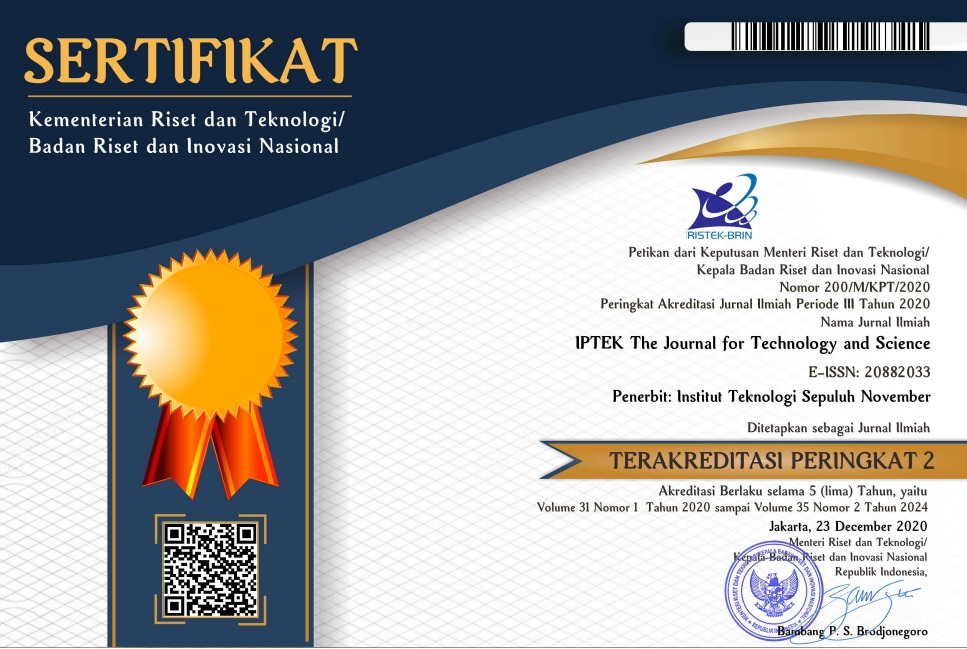Adaptive Assessment and Guessing Detection Implementation
Abstract
Keywords
Full Text:
Full TextReferences
Kennedy KJ, Lee JCK. The Changing Role of Schools in Asian Societies. Routledge; 2007. https://www.taylorfrancis.com/books/9781134127306.
Kemendikbud. Panduan Penilaian Untuk Sekolah Dasar (SD). Kementrian Pendidikan dan Kebudayaan; 2016.
Kemendikbud. Panduan Penilaian oleh Pendidik dan Satuan Pendidikan Atas. Kementrian Pendidikan dan Kebudayaan; 2017.
Kemendikbud. Panduan Penilaian Untuk SMA. Kementrian Pendidikan dan Kebudayaan; 2015.
Peng SS, Lee JCK. Educational evaluation in East Asia: Emerging issues and challenges. Nova Science Publishers, UK; 2011.
Hwang GJ. A conceptual map model for developing intelligent tutoring systems. Computers & Education 2003 4;40:217–235. https://www.sciencedirect.com/science/article/abs/pii/S0360131502001215https://linkinghub.elsevier.com/retrieve/pii/S0360131502001215.
Hwang GJ, Sung HY, Chang SC, Huang XC. A fuzzy expert system-based adaptive learning approach to improving students’ learning performances by considering affective and cognitive factors. Computers and Education: Artificial Intelligence 2020;1:100003. https://doi.org/10.1016/j.caeai.2020.100003https://linkinghub.elsevier.com/retrieve/pii/S2666920X20300035.
Tseng WT. Measuring English vocabulary size via computerized adaptive testing. Computers & Education 2016 6;97:69–85. https://linkinghub.elsevier.com/retrieve/pii/S0360131516300501.
Louhab FE, Bahnasse A, Talea M. Towards an Adaptive Formative Assessment in Context-Aware Mobile Learning. Procedia Computer Science 2018;135:441–448. https://doi.org/10.1016/j.procs.2018.08.195.
Pan CC, Lin CC. Designing and implementing a computerized adaptive testing system with an MVC framework: A case study of the IEEE floating-point standard. Proceedings of 4th IEEE International Conference on Applied System Innovation 2018, ICASI 2018 2018;p. 609–612.
Vega YLP, Bolanos JCG, Nieto GMF, Baldiris SM. Application of item response theory (IRT) for the generation of adaptive assessments in an introductory course on object-oriented programming. Proceedings - Frontiers in Education Conference, FIE 2012;p. 0–3.
Uto M, Ueno M. Item Response Theory for Peer Assessment. IEEE Transactions on Learning Technologies 2016 4;9:157–170. http://ieeexplore.ieee.org/document/7243342/.
Cui W, Xue Z, Shen J, Sun G, Li J. The Item Response Theory Model for an AI-based Adaptive Learning System. In: 2019 18th International Conference on Information Technology Based Higher Education and Training (ITHET) IEEE; 2019. p.1–6. https://ieeexplore.ieee.org/document/8937383/.
Chrysafiadi K, Troussas C, Virvou M. Combination of fuzzy and cognitive theories for adaptive e-assessment. Expert Systems with Applications 2020;161:113614. https://doi.org/10.1016/j.eswa.2020.113614.
Delgado-Gómez D, Laria JC, Ruiz-Hernández D. Computerized adaptive test and decision trees: A unifying approach. Expert Systems with Applications 2019;117:358–366.
Rodríguez-Cuadrado J, Delgado-Gómez D, Laria JC, Rodríguez-Cuadrado S. Merged Tree-CAT: A fast method for building precise computerized adaptive tests based on decision trees. Expert Systems with Applications 2020 4;143:113066. https://linkinghub.elsevier.com/retrieve/pii/S0957417419307833.
Ridwan W, Wiranto I, Dako RDR. Ability estimation in computerized adaptive test using Mamdani Fuzzy Inference System. IOP Conference Series: Materials Science and Engineering 2020 5;850:012004. https://iopscience.iop.org/article/10.1088/1757-899X/850/1/012004.
Lendyuk T, Sachenko S, Rippa S, Sapojnyk G. Fuzzy rules for tests complexity changing for individual learning path construction. In: 2015 IEEE 8th International Conference on Intelligent Data Acquisition and Advanced Computing Systems: Technology and Applications (IDAACS), vol. 2 IEEE; 2015. p. 945–948. http://ieeexplore.ieee.org/document/7341443/.
Wise SL. An investigation of the differential effort received by items on a low-stakes computer-based test. Applied Measurement in Education 2006;19:95–114.
Pastor DA, Ong TQ, Strickman SN. Patterns of Solution Behavior across Items in Low-Stakes Assessments. Educational Assessment 2019 7;24:189–212.
Demars CE. Changes in Rapid-Guessing Behavior Over a Series of Assessments. Educational Assessment 2007 4;12:23–45.
DeMars CE, Wise SL. Can differential rapid-guessing behavior lead to differential item functioning? International Journal of Testing 2010;10:207–229.
Setzer JC, Wise SL, van den Heuvel JR, Ling G. An Investigation of Examinee Test-Taking Effort on a Large-Scale Assessment. Applied Measurement in Education 2013 1;26:34–49. http://www.tandfonline.com/doi/abs/10.1080/08957347.2013.739453.
Wise SL, Kong X. Response Time Effort: A New Measure of Examinee Motivation in Computer-Based Tests. Applied Measurement in Education 2005 4;18:163–183. http://www.tandfonline.com/doi/abs/10.1207/s15324818ame1802_2.
Silm G, Must O, Täht K. Test-taking effort as a predictor of performance in low-stakes tests. Trames Journal of the Humanities and Social Sciences 2013;17:433. http://www.kirj.ee/?id=23010&tpl=1061&c_tpl=1064.
Wise SL, Ma L, Kingsbury GG, Hauser C. An investigation of the relationship between time of testing and test-taking effort. National Council on Measurement in Education 2010;p. 1–18.
Wise SL. Rapid-Guessing Behavior: Its Identification, Interpretation, and Implications. Educational Measurement: Issues and Practice 2017 12;36:52–61. https://onlinelibrary.wiley.com/doi/10.1111/emip.12165.
Zadeh LA. Fuzzy sets. Information and Control 1965 6;8:338–353. https://linkinghub.elsevier.com/retrieve/pii/S001999586590241X.
Mamdani EH. Application of Fuzzy Algorithms for Control of Simple Dynamic Plant. Proceedings of the Institution of Electrical Engineers 1974;121:1585–1588.
Schnipke DL. Assessing Speededness in Computer-based tests using item response times. Dissertation 1995.
Lin CK. Effects of Removing Responses With Likely Random Guessing Under Rasch Measurement on a Multiple-Choice Language Proficiency Test. Language Assessment Quarterly 2018 10;15:406–422. https://www.tandfonline.com/doi/full/10.1080/15434303.2018.1534237.
DOI: http://dx.doi.org/10.12962%2Fj20882033.v33i1.12027
Refbacks
- There are currently no refbacks.
IPTEK Journal of Science and Technology by Lembaga Penelitian dan Pengabdian kepada Masyarakat, ITS is licensed under a Creative Commons Attribution-ShareAlike 4.0 International License.
Based on a work at https://iptek.its.ac.id/index.php/jts.


